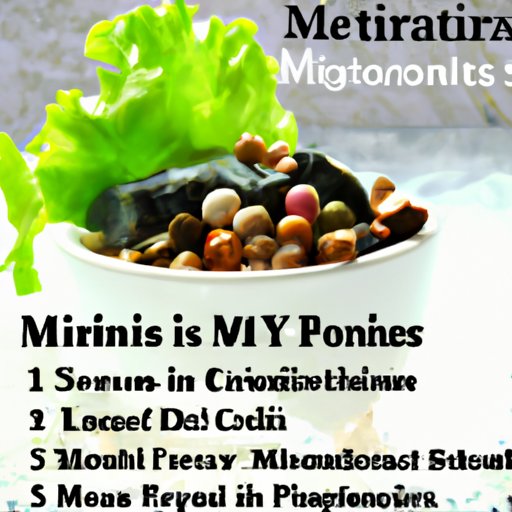Introduction
Minerals are essential nutrients that play a key role in maintaining optimal health. They are found in foods such as dairy products, fruits and vegetables, whole grains, legumes, nuts and seeds. While minerals are often overlooked in favor of vitamins, they are just as important for overall health and wellbeing. In this article, we will explore the benefits of minerals in nutrition, types of minerals and their role in nutrition, and how to get the right amount of minerals in your diet.

Benefits of Minerals in Your Diet
Minerals play an important role in many bodily functions, from improving bone health to regulating blood pressure. Here are some of the key benefits of minerals in nutrition:
- Improved Bone Health: Minerals are essential for building strong bones and teeth, and for keeping them healthy. Calcium is one of the most important minerals for bone health, but other minerals such as magnesium, zinc, and phosphorus also play an important role.
- Immune System Support: Minerals are not only important for physical health, but they also play a key role in immune system function. Zinc, iron, and selenium are all essential minerals for a healthy immune system.
- Blood Pressure Regulation: Potassium and magnesium are two minerals that can help regulate blood pressure and reduce the risk of hypertension.
- Proper Nerve Function: Minerals such as calcium and magnesium are essential for proper nerve function.
Types of Minerals and Their Role in Nutrition
Minerals are divided into two main categories: macrominerals and trace minerals. Macrominerals are minerals that are needed in larger amounts, while trace minerals are needed in smaller amounts. Here are some of the most important minerals for nutrition and their role in the body:
- Calcium: Calcium is essential for strong bones and teeth, muscle contraction, and nerve transmission. It is also necessary for blood clotting and hormone secretion.
- Magnesium: Magnesium is important for energy production, muscle and nerve function, and blood sugar regulation.
- Potassium: Potassium helps regulate blood pressure and fluid balance in the body. It also helps with muscle contraction and nerve transmission.
- Iron: Iron is essential for healthy red blood cells and transporting oxygen throughout the body.
- Zinc: Zinc is important for immune system function, wound healing, and growth and development.
- Selenium: Selenium is important for thyroid health and immunity.
- Copper: Copper helps with energy production, iron absorption, and collagen production.
- Manganese: Manganese is important for bone health, metabolism, and antioxidant defense.

How to Get the Right Amount of Minerals in Your Diet
Getting the right amount of minerals in your diet is essential for optimal health. Here are some tips for making sure you get the right amount of minerals in your diet:
- Eat a Balanced Diet: Eating a balanced diet that includes a variety of whole foods is the best way to get the minerals your body needs. Be sure to include plenty of fruits, vegetables, whole grains, legumes, nuts, and seeds in your diet.
- Include Whole Foods: Whole foods such as fruits and vegetables are rich in minerals and other essential nutrients. Try to include at least five servings of fruits and vegetables per day.
- Take Supplements: If you are unable to get the right amount of minerals through your diet, consider taking a multivitamin or mineral supplement. Talk to your doctor before taking any supplements.
How Do Minerals Affect Your Health?
Minerals play a key role in many bodily functions, from promoting growth and development to strengthening bones and teeth. Here are some of the ways minerals affect your health:
- Promote Growth and Development: Minerals such as calcium, magnesium, and zinc are essential for growth and development.
- Improve Metabolic Processes: Minerals such as iron and copper are necessary for metabolic processes such as energy production and digestion.
- Strengthen Bones and Teeth: Calcium, magnesium, and phosphorus are essential for strong bones and teeth.
- Enhance Energy Production: Minerals such as iron and magnesium are essential for energy production.
What Foods are High in Minerals?
Many foods are high in minerals, including dairy products, fruits and vegetables, whole grains, legumes, nuts and seeds. Here are some of the best sources of minerals:
- Dairy Products: Dairy products such as milk, cheese, and yogurt are good sources of calcium, phosphorus, and magnesium.
- Fruits and Vegetables: Fruits and vegetables are excellent sources of minerals such as potassium, magnesium, and iron.
- Whole Grains: Whole grains such as oats and quinoa are rich in minerals such as iron, magnesium, and selenium.
- Legumes: Legumes such as beans and lentils are rich in minerals such as iron, zinc, and magnesium.
- Nuts and Seeds: Nuts and seeds are excellent sources of minerals such as magnesium, zinc, and selenium.

The Difference Between Minerals and Vitamins
Minerals and vitamins are both essential nutrients, but they have different structures and functions. Here is a look at the differences between minerals and vitamins:
- Definition of Minerals and Vitamins: Minerals are elements that come from the earth, while vitamins are organic compounds found in foods.
- Differences in Structure: Minerals are inorganic, meaning they do not contain carbon, while vitamins are organic, meaning they contain carbon.
- Differences in Function: Minerals are involved in many bodily functions, from energy production to bone health, while vitamins are involved in metabolism and other biochemical reactions.
Conclusion
Minerals are essential nutrients that play a key role in many bodily functions, from improving bone health to regulating blood pressure. Eating a balanced diet that includes a variety of whole foods is the best way to get the minerals your body needs. Include plenty of fruits, vegetables, whole grains, legumes, nuts, and seeds in your diet, and consider taking a multivitamin or mineral supplement if needed. By getting the right amount of minerals in your diet, you can reap all the benefits of minerals in nutrition.
(Note: Is this article not meeting your expectations? Do you have knowledge or insights to share? Unlock new opportunities and expand your reach by joining our authors team. Click Registration to join us and share your expertise with our readers.)
